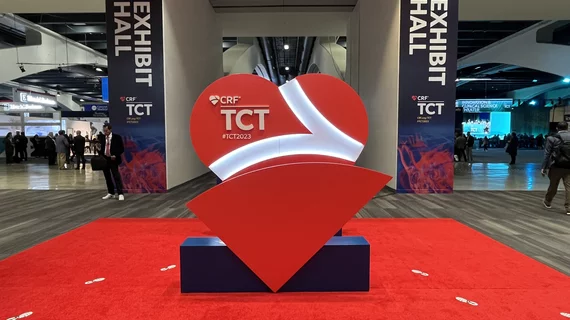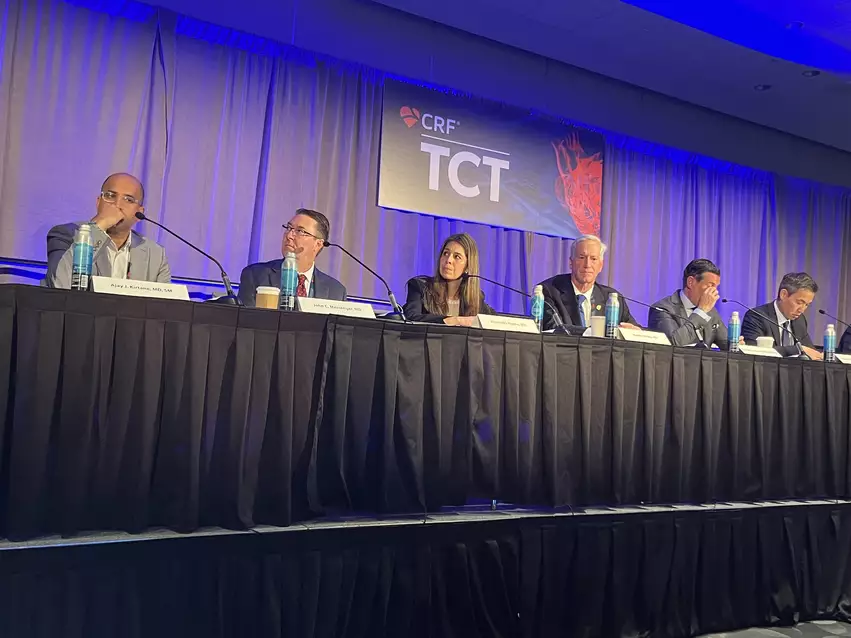Late-breaking clinical trials at TCT 2023 could lead to FDA approvals for Abbott, Boston Scientific
The second round of late-breaking clinical trials at TCT 2023 in San Francisco included updates on two technologies that could reshape the very future of interventional cardiology.
While the LIFE-BTK trial focused on a new-look device for infrapopliteal interventions, the AGENT IDE trial provided new data on a drug-coated balloon (DCB) U.S. cardiologists have been wanting to use for years.
Both studies have a good chance of leading to a key approval from the U.S. Food and Drug Administration (FDA).
LIFE-BTK
Robert L. Varcoe, MBBS, MS, PhD, an associate professor of vascular surgery with the University of New South Wales, kicked off the sessions by sharing data from the LIFE-BTK trial, which examined the safety and effectiveness of the Esprit BTK Drug-Eluting Resorbable Scaffold, a new interventional device from Abbott for critical limb-threatening ischemia (CLTI).
The Esprit BTK system is similar to a dissolvable suture; after doing its job for a certain number of weeks, it simply dissolves into the patient’s bloodstream. The LIFE-BTK trial included 261 CLTI patients who were randomized to either undergo treatment with the new device or undergo traditional balloon angioplasty. Overall, the study’s primary endpoint—freedom from above-ankle amputation, 100% total occlusion of the target vessel, binary restenosis of the target lesion and clinically driven target lesion revascularization—was seen in 74.2% of patients treated with the new device and 47.9% of patients treated with balloon angioplasty. The study’s safety endpoints, meanwhile, were comparable between the two treatment options.
If approved, Varcoe explained, the Esprit BTK system could give interventional cardiologists a new tool in the battle against CLTI. The industry seems to sense that the device could make a significant impact; the audience was packed for Varcoe’s presentation, and the cardiologists on hand seemed impressed by its potential.
“One of the big challenges in peripheral vessels in particular is that these vessels are under a fair bit of motion and there is a lot of device-vessel interaction, which you’d really like to avoid in the long term,” John C. Messenger, MD, an interventional cardiologist with the University of Colorado Medicine, said during a TCT press conference. “I think the bioresorbable scaffolding is a fantastic application here, because it really allows you to conquer … the initial stabilization of lesion wound healing and then the device basically goes away.”
Abbott has said it will seek approval from the FDA for the Esprit BTK system based largely on the success of this trial.
The full analysis was simultaneously published in the New England Journal of Medicine.[1]
AGENT IDE
Robert W. Yeh, MD, MSc, MBA, an interventional cardiologist with Beth Israel Deaconess Medical Center, was up next with his highly anticipated presentation of data from the AGENT IDE trial.
AGENT IDE tracked patient outcomes after treatment with the Agent Drug-Coated Balloon from Boston Scientific, a Paclitaxel-coated balloon catheter that received CE mark approval back in 2014, but never gained approval in the United States.
AGENT IDE included data from 480 high-risk patients. While 321 were treated with the Agent DCB, the remaining 159 patients were treated with balloon angioplasty. More than half of both patient groups presented with diabetes.
Overall, target lesion failure after one year was seen in 28.7% of balloon angioplasty patients and 17.9% of Agent DCB patients, a relative risk reduction of 38%. The Boston Scientific device was also linked to a reduced risk of stent thrombosis, target lesion revascularization and target vessel myocardial infarction.
The crowd at TCT broke out into applause in the middle of Yeh’s presentation when he shared these statistics, something rarely seen at scientific conferences. This is because no coronary DCB is currently approved by the FDA, even though other countries have been using them for several years.
The AGENT DCB received the FDA’s breakthrough device designation in 2021, and the agency even worked closely with Yeh when organizing this analysis. Boston Scientific will now seek a full FDA approval for this device.
During a press conference discussing the results, multiple panelists shared their own excitement over the possibility of a coronary DCB finally gaining FDA approval.
“Our European colleagues have had these devices for a decade,” said Ajay J. Kirtane, MD, an interventional cardiologist with the Columbia University Department of Medicine. “In the United States, we basically tell patients routinely that we can use a peripheral balloon that is too big for your coronary and try to put it in your coronary to prevent the restenosis from happening, or you can buy a ticket to London and go over there to get this treated. It’s embarrassing.”
American College of Cardiology President B. Hadley Wilson, MD, meanwhile, described the new analysis as a “game changer.”
“For 25 years, we’ve been trying to peel back this restenosis problem,” he said. “Now we can see light at the end of the tunnel. This is really terrific work.”


